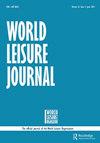休闲学习的贡献:对托拉和其他充实学习者的影响
IF 2
Q3 HOSPITALITY, LEISURE, SPORT & TOURISM
引用次数: 0
摘要
摘要目的本研究旨在评估参与《托拉》/《圣经》研究的休闲学习者是否比学习其他科目的人报告了更高的精神水平,以及更高水平的精神水平是否会带来更高的生活意义和更多的社会心理资源,特别是希望和生活质量。方法对234名参与者进行调查,他们在业余时间学习《托拉》或其他科目。参与者完成了自我报告问卷,报告他们的精神动力来源、研究对象的特点、对学习经历的评价以及他们的生活意义、希望和生活质量。结果定量测量显示,托拉学习者的生活质量较高受生活意义、个人精神和希望的影响,但不受对上帝信仰的影响。与《托拉》学习者相比,在非《托拉书》学习者中,个人精神和希望与生活质量的联系更强,与生活意义的联系较弱。结论托拉和其他研究对象对学习者的心理社会资源有不同的影响。本研究强调了在正式学生中推广精神来源对学习的发现,以及托拉和其他丰富学习者之间不同的社会行为的重要性。本文章由计算机程序翻译,如有差异,请以英文原文为准。
Leisure Learning's Contribution: Effects on Torah and Other Enrichment Learners
ABSTRACT Aim The study was aimed to assess whether leisure learners who engage in Torah/Bible studies report higher levels of spirituality than those who study other subjects, and whether higher levels of spirituality result in a higher meaning in life and greater psychosocial resources, specifically hope and quality of life. Methods A survey of 234 participants, who study either Torah or other subjects in their leisure time. Participants completed self–report questionnaires to report their spiritual sources of motivation, features of the subject of study, evaluations of their learning experience, and their meaning in life, hope, and quality of life. Results Quantitative measures showed that higher quality of life among Torah learners was affected by meaning in life and by personal spirituality and hope, but was not affected by faith in God. Among non–Torah learners, personal spirituality and hope had stronger associations with quality of life and weaker associations with meaning in life, compared to Torah learners. Conclusions Torah and other subject of study had different effects on learners' psychosocial resources. This study emphasizes the importance of generalizing the findings of sources of spirituality on learning among formal students as well as different social behaviors between Torah and other enrichment learners.
求助全文
通过发布文献求助,成功后即可免费获取论文全文。
去求助
来源期刊

World Leisure Journal
HOSPITALITY, LEISURE, SPORT & TOURISM-
CiteScore
3.10
自引率
6.20%
发文量
34
期刊介绍:
As the official journal of the World Leisure Organisation, the purpose of the World Leisure Journal is to stimulate and communicate research, theory, and critical thought in all areas that address leisure, including play, recreation, the arts and culture, sport, festivals, events and celebrations, health and fitness, and travel and tourism. Empirical and theoretical manuscripts, as well as position papers, review articles, and critical essays are published in the World Leisure Journal . The World Leisure Journal is international in scope, and encourages submissions from authors from all areas of the world. Comparative cross-national and cross-cultural research reports are especially welcome. For empirical papers, all types of research methods are appropriate and the subject matter in papers may be addressed from perspectives derived from the social, behavioural, and biological sciences, education, and the humanities. Both pure and applied research reports are appropriate for publication in the World Leisure Journal . In addition to original research reports and review essays, book reviews, research notes, comments, and methodological contributions are appropriate for publication in the World Leisure Journal .
 求助内容:
求助内容: 应助结果提醒方式:
应助结果提醒方式:


